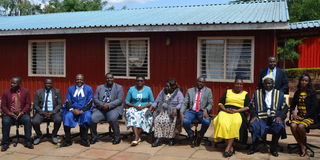Failure to complete county HQ dominates Tharaka Nithi campaigns

Members of Tharaka Nithi County Assembly during a photo session outside semi-permanent chambers at Kathwana on June 8, 2022. Gubernatorial campaigns are revolving around the development of the county headquarters.
The development of Kathwana as the Tharaka Nithi headquarters has dominated campaigns in the county.
After 10 years of devolution, the county seat of power is yet to be completed, with all national government officers who are supposed to work from Kathwana still operating from Chuka town, over 30km away.
The county assembly offices and those of several county government departments are also still in Chuka.
In 2012, at the advent of devolution, leaders from the three Tharaka Nithi constituencies – Tharaka, Chuka/Igambang’ombe and Maara – met and unanimously agreed that Kathwana should become the centre of power for the devolved unit due to its central location and enough space for expansion, among other factors.
There were no offices in Kathwana and the first governor, Samuel Ragwa, worked from the nearby Chiakariga campus of the Kenya Water Institute for months before he built an office.
Mr Ragwa also built iron-sheet semi-permanent offices for county workers, ward reps operated under a tent before building temporary, iron-sheet chambers.
He started building Sh400 million executive offices and Sh360 million assembly chambers in 2015 that have not been completed.
The five-storey executive building is at the roofing stage, while the assembly one has stalled at the foundation since 2015.
The national government recently built an office for the county commissioner in Kathwana, but the official is yet to relocate from Chuka because there is no residential house and the other county departmental heads have no offices.
During the 2017 campaigns, Governor Muthomi Njuki capitalised on the situation, promising to complete the county headquarters if he was elected.
He accused Mr Ragwa of failing to ensure that all county government offices in Chuka were moved to Kathwana.
He also claimed that Kathwana was still a dusty market and promised to transform it into a modern municipality.
Five years down the line, workers still operate from the iron-sheet offices and MCAs debate in their temporary chambers.
But Mr Njuki tarmacked a one-kilometre stretch from the main road to his office and around the town centre.
The building of an open-air market is going on but residents are still suffering from lack of clean piped water and the municipality has no sewerage system.
Several candidates are seeking to unseat Mr Njuki of the United Democratic Alliance. They are Prof Erastus Njoka (Jubilee), Dr Mzalendo Kibunjia (Narc Kenya), Gitari Mbiuki (Chama Cha Kazi) and Mr Njuki’s deputy Nyamu Kagwima (Wiper).
Each has promised to transform Kathwana if elected.
They have pledged to relocate all county government offices to Kathwana after completing the stalled buildings, ensure municipality roads are tarmacked and provide adequate clean water and a modern sewerage system.
Speaking during the launch of his manifesto last Monday, Prof Njoka also promised to come up with incentives that would attract private investors to the municipality.
“Our municipality has no single bank or supermarket, among other social amenities, and this is because the business environment is not friendly,” Prof Njoka said.
Dr Mzalendo has also pledged to grow the economy of Kathwana by encouraging industrialization, which he said will create job opportunities.
“Kathwana is our county headquarters and the county needs a governor who has plans to grow it by first making sure that all devolved and national government offices relocate there,” he said.
On his side, Governor Njuki wants a second term to complete his ongoing projects and start more.
He has denied claims from his opponents that he had neglected Kathwana.
“Don’t listen to my opponents who are accusing me of neglecting Kathwana. I have already transformed it from a dusty market to a modern municipality,” he said.





